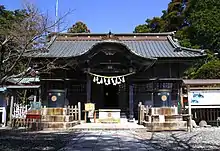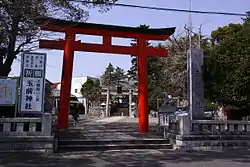Tamasaki Shrine
Tamasaki Jinja (玉前神社) is a Shinto shrine in the town of Ichinomiya in Chiba Prefecture, Japan. It is the ichinomiya of former Kazusa Province. The main festival of the shrine is held annually on September 13, and features kagura performances, which are listed as an Intangible Cultural Property of Chiba Prefecture[1]
| Tamasaki Jinja 玉前神社 | |
|---|---|
 Haiden of Tamasaki Shrine | |
| Religion | |
| Affiliation | Shinto |
| Deity | Tamayori-hime no mikoto |
| Location | |
| Location | 3048 Ichinomiya, Ichinomiya-machi, Chosei-gun, Chiba |
 Shown within Japan | |
| Geographic coordinates | |
| Architecture | |
| Date established | unknown |
| Website | |
| www | |
Enshrined kami
The main kami of Tamasaki Jinja are the male Tamasaki no kami (玉埼神), who is identified with Ugayafukiaezu-no-Mikoto and the female Tamayori-hime no mikoto (玉依姫命); the parents of Emperor Jimmu.
History
The origins of Tamasaki Jinja are unknown. The shrine is located in an area of the Bōsō Peninsula with a favorable climate, which has been settled since at least the Jōmon period. Shell middens and burial mounds are common in the area. The shrine is mentioned as the ichinomiya of Kazusa Province in the Engishiki records from the early Heian period. However, repeated fires and other disasters over the centuries have destroyed all of the old shrine records and buildings. The shrine was burned down in 1562 during a battle involving the Satomi clan and was rebuilt by the Satomi in 1587. Additional structures were donated by Tokugawa Ieyasu in 1591 and the shrine reconstructed in 1687. During the Meiji period era of State Shinto, the shrine was rated as a Kokuhei Chūsha (国幣中社). [2]
Cultural Properties
- Bronze Mirror, Kamakura period, National Important Cultural Property
See also
| Wikimedia Commons has media related to Tamasaki-jinja. |
References
- Plutschow, Herbe. Matsuri: The Festivals of Japan. RoutledgeCurzon (1996) ISBN 1-873410-63-8
- Ponsonby-Fane, Richard Arthur Brabazon. (1959). The Imperial House of Japan. Kyoto: Ponsonby Memorial Society. OCLC 194887
Notes
- Plutschow. Matsuri: The Festivals of Japan. Page 173
- Ponsonby-Fane, Richard. (1959). The Imperial House of Japan, pp. 125.
